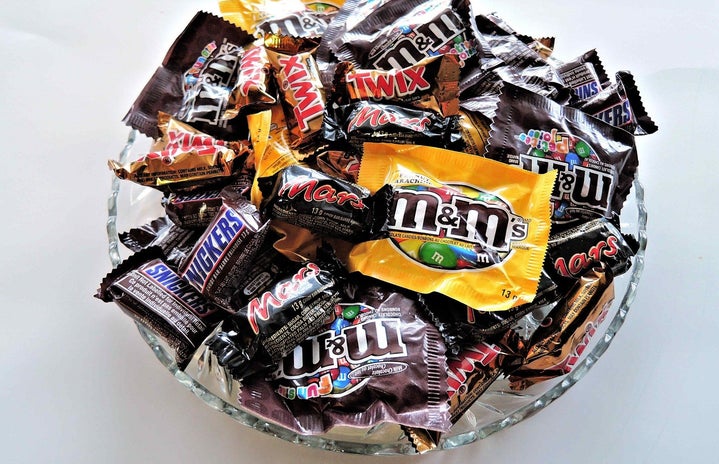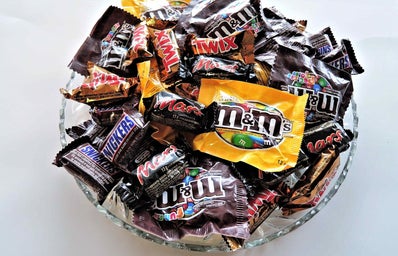TW: Restrictive eating
Disclaimer: This article in no way condones or encourages restrictive eating or unhealthy dieting. Please always speak to your GP before trying a new diet, especially one as drastic as this.
We all know that a diet full of sweet treats is bad for us. We’ve been warned time and time again by everyone from the NHS to Buzzfeed that we need to cut down on our sugar consumption. But while most of us know that it’s is bad for us, we often don’t realise just how much we consume daily. When I set out to remove added sugar and sweeteners from my diet for a month, I honestly thought it wouldn’t be that much of a challenge – yes, I indulge in the occasional dessert or chocolate bar just like everyone else, but surely I didn’t eat that much sugar, right?
Before I talk about my 30-day sugar-free challenge, however, let’s talk facts: What exactly is added sugar? And why did I choose to do this challenge in the first place?
What are ‘free sugars’, and why are they such an issue?
According to the NHS, the sugars most overeaten in the UK are ‘free sugars’; added sugars such as those found in fizzy drinks or biscuits, and the natural sugars found in syrups, honey, and even unsweetened fruit juices. Whilst the latter category may consist of natural sugars, unfortunately our bodies can’t tell the difference – so, whether you’re eating healthy-style granola with organic honey for breakfast or a monster slice of chocolate cake, your body will process it just the same; do with this information what you will.
Eating too much of this free sugar has been linked to weight gain, tooth decay and type 2 diabetes. Research also suggests that it can contribute to overeating as it can cause resistance to leptin, the hormone in charge of regulating our hunger and telling our bodies when to stop eating. However, it is important to note that not all sugars are ‘bad’ sugars, and free sugars do not include the sugar found naturally in dairy, cereal grains, nuts, fruit and vegetables.
Why are we overeating sugar?
I decided to quit free sugars after I realised that in lockdown, my usually-semi-healthy diet had begun to consist of a lot more sweet treats than it used to. Whilst processed snacks used to be a rare indulgence for me, being stuck in the house with not much to do has caused sweets and other unhealthy snacks to sneak into my diet. Unsurprisingly, the more I ate of them, the more I craved them. I’m not the only one overeating sugar, though. Whilst guidelines say that sugars should only comprise of 5% of our daily calorie intake (approximately 30g or 7tsp), a study by the World Health Organisation found that in the UK, the number is closer to 16-17%. This major overconsumption can be linked to several factors:
- Sugar is addictive. Research shows that sugar triggers dopamine release in our nucleus accumbens, a fancy word for the area of the brain that responds to addictive drugs.
- Eating sugar can cause a vicious cycle of (over)consumption. Glucose and other sugars cause our blood sugar to spike and then quickly drop; this sudden drop causes tiredness and headaches, encouraging us to reach for another sugary hit to reach that spike again.
- Perhaps most importantly, sugars are everywhere. I’ll get into this more later, but it’s safe to say that I was shocked by the amount of sugar I had been eating in foods I would never have thought to look at.
How do we avoid overeating sugar?
There are many things we can be doing to be more mindful of our sugar intake. The list below is by no means extensive, but definitely a great way to start:
- Read the labels and nutritional information
Make it a habit to read the nutritional information on the foods you eat. Whilst this can be time-consuming to start with, it is vital that you understand what’s actually in the foods you’re consuming if you want to monitor your sugar intake.
A significant part of limiting sugar is understanding the different names for it. Most of us know glucose and fructose, but there’s a whole host of other names sugar can be categorised under. As a general rule, if an ingredient ends with “-ose”, it’s sugar. For a list of names to look out for, check out this poster.
This was the most eye-opening part of the challenge for me as I hadn’t realised how much of the sugar I ate was hidden in what I considered to be inoffensive food items – from bread to sausages to oven chips, my pantry was filled with the offending ingredient. According to Sugar Science, added sugar is in 74% of packaged food, so it’s necessary to check every label. Even if you know that an item has sugar in it, you may be shocked by just how much; one tablespoon of ketchup, for example, has 4g of sugar – a devastating fact I discovered early on in my 30-day challenge.
- Reduce your fizzy drink and juice intake
Non-alcoholic drinks are the second largest source of added sugar in the British diet. Whilst personally, I had no issue with this – I’ve cut fizzy drinks from my diet for more than a year now – I can definitely understand how challenging this step could be. Again, knowing the facts is really helpful. A 2014 survey found that 79% of fizzy drinks contain over 6tsp of sugar per can, equivalent to the recommended daily maximum. For more on how much sugar your favourite fizzy drinks contain, I highly recommend looking at their survey results here. If you wish to live in blissful ignorance however, I do not blame you.
- Make more meals from scratch
It can’t be overstated just how much sugar is in processed, pre-made foods. It’s definitely not as convenient as picking up a 55p pasta sauce from the store, but making things yourself is the best way to avoid unnecessary overconsumption. It can also be really delicious, and a fun way to improve your culinary skills! Plus, if you decide to go cold turkey on sugar like me, it’s almost definitely the only way you’ll be able to eat things such as soups or pasta sauces – depressingly I am yet to find any without sugar, and not for lack of trying…
My Sugar-Free Experience
To be completely honest, I had no idea what to expect from this challenge. I was really fortunate that I didn’t experience any of the adverse side effects I was told could come from cutting sugar, such as headaches, fatigue and anxiety. However, I did initially experience bouts of dizziness – although luckily for me these usually went away after I had an apple. Surprisingly, I experienced pretty minimal cravings, except for when I got my period; in a moment of desperation I Amazon Prime’d a 100% cacao sugar-free chocolate bar that turned out to be the worst thing I’ve eaten in a long time. Definitely a low point. The rest of the time though, the only thing I struggled with was the convenience of processed foods – a quick takeaway that wasn’t just a salad without the dressing would’ve been a welcome sight.
In terms of physical changes, I saw a noticeable difference in my skin with far fewer breakouts. To make matters even better, I finally – after months of trying – was able to get into a proper sleep routine. Whilst I can’t definitively say that giving up sugar was the reason, it definitely couldn’t have hurt! As someone who struggles massively with sleep, this was amazing and made the entire 30 days worth it.
What challenges did I face?
As someone who likes to meal prep and experiment with new recipes, one of the main challenges for me was the inordinate amount of time to find recipes that I could eat. Other issues included not being able to find substitutions for some of my favourite ingredients and giving up foods I ate almost daily before, such as veggie stock and tomato puree.
Overall, the biggest challenge that I could see with cutting out sugar is the social aspect. Thanks to Corona, this wasn’t a massive issue for me as lockdown meant that I wasn’t going out for food or drinks, but under normal circumstances I can imagine I would’ve really struggled. Not only is alcohol all but ruled out – a hard enough task for a student – but it would also be virtually impossible to find sugar-free meals on a regular menu.
Will I go back to added sugars?
If I’m being completely honest, I won’t be continuing this diet for a multitude of reasons. Not only can it be time-consuming and more expensive to eat sugar-free, but the restrictions that it would place on my social life aren’t worth it to me.
That’s not to say, however, that I regret this challenge or that I haven’t learnt anything – it’s definitely made me a lot more mindful; from now on I’ll be better able to monitor what I’m putting in my body, and be more aware of unhealthy sugar consumption. Life is all about balance, so whilst I know that I don’t need to succumb to every craving I have – aka, giving up the 1AM can’t-sleep-so-I’ll-eat brownie – I also know that being kind to yourself is important too. Whilst physical health is really important, so is mental – don’t ever feel guilty for going out with friends, treating yourself now and again, and enjoying your life – with or without sugar!
Words By: Annabel Cohen
Edited By: Amelia Reed



